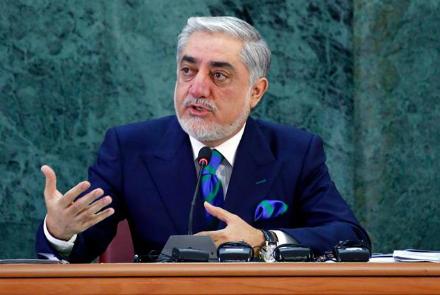In order to resolve the issues between Afghanistan and Pakistan, Afghanistan expects that all agreements and issues discussed during Pakistan Prime Minister Shahid Khaqan Abbasi’s recent trip to Kabul are implemented, the Chief Executive Officer (CEO) Abdullah Abdullah said on Monday.
President Ashraf Ghani and Abbasi held talks in Kabul last week where they agreed to seven key principles to finalize Afghanistan-Pakistan Action Plan for Peace and Solidarity (APAPPS).
Addressing the Council of Ministers meeting in Kabul on Monday, Abdullah said prime ministers from Pakistan and Turkey visited Kabul in the past week to discuss issues around bilateral relations.
The CEO said talks were held with Abbasi as “we are interested in solving the problems.”
He said he hopes Pakistan will work on resolving the challenges and responding to the good intentions of Afghanistan, saying that the leadership of the National Unity Government is optimistic about the situation.
"An agreement has been signed between the president and the prime minister of Pakistan on seven principles. But that does not mean that both parties are in the same situation. We are completely in a different situation. The source of our problems is clear. Anyway, the basis of this agreement may have been our optimistic spirit. The stance of the National Unity Government is about the right to the peace process. At the same time, it's the duty of all of us to defend the people, the land and the safety of the country. "
Abdullah’s statement comes on the heels of ongoing claims by Afghanistan that Pakistan has not delivered on its commitments regarding the fight against terrorism.
Abdullah also raised the issue of the Afghanistan Independent Human Rights Commission’s (AIHRC) report last week on the abuse of children, and said the findings were shocking.
Abdullah said having children and teenagers employed in the Afghan security forces is not acceptable and it should not be tolerated.
AIHRC in its recent report said 16 percent of Afghan children and teenagers are subjected to sexual abuse.
Pakistan’s role in the campaign against militancy has also been a reason for tension between the two countries.
In recent months, the US has increased pressure on Islamabad in an effort to get Pakistan to support Afghanistan in its peace process.
During his Kabul trip, Abbasi also met with other senior Afghan political leaders including Gulbadin Hekmatyar, Mohammad Mohaqiq, Mohammad Karim Khalili, and Sayed Hamed Gailani, to convey the support of the government and people of Pakistan to all ethnic groups in Afghanistan and to underscore Pakistan’s commitment to peace and stability in Afghanistan, Pakistan's statement read.
Members of Afghanistan’s Meshrano Jirga (Upper House of Parliament) were on Sunday sceptical about hoped-for results of Abbasi’s visit to Afghanistan, saying Pakistan’s military and civilian government have a different view of Pakistan’s policy on Afghanistan.
Senators urged the Afghan government to be cautious with regards to talks with Pakistan.
But some senators argued that the trip was part of Pakistan’s continued efforts to decrease the mounting pressure on Islamabad by the international community.


